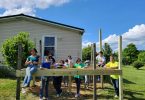(It is often in the breaking of bread that we meet Jesus)
When All Hope Seems Lost
by Bishop Chris Giesler
Preaching Text: Luke 24:13-35
Last week we met Thomas and all of the other doubting disciples in the account from John chapter 20. This week, in Luke’s Gospel, we meet two more doubting disciples; one is named, and the other is not. Cleopas and this other disciple are nowhere else mentioned in the Bible, but the word used to characterize their mood on this day is “sad.”
We all have hopes for the future. We hope for a better life for our children. We hope that our upcoming vacation will be as much fun as we have planned. We hope the weather will be nice for the picnic. At the same time, farmers hope there will be enough rain for the crops to grow.
The story of the two disciples walking home from Jerusalem to Emmaus is a reminder of the importance of paying attention and being open to the unexpected, even when our hopes don’t materialize. The disciples on the road to Emmaus were disappointed, discouraged, and disillusioned, as their hopes for Jesus had not been realized.
The phrase in this text that catches my attention is “They had hoped.” They had hoped for a king to redeem Israel, but their expectations were unmet. Jesus, the one they had hoped would help lead the rebellion against the Romans, had just been executed by those very people. These disciples also had seemingly false hopes about Jesus’ resurrection. Our text tells us that the women (Mary Magdalene and others) had gone to the tomb and found it empty. They immediately rushed back to tell the disciples and report that they had seen angels. The other doubting disciples found this an “idle tale,” so Peter went to the tomb himself to investigate. He was “amazed” to see the tomb empty but could not locate Jesus
Not knowing what to do next, Cleopas and the other disciple begin the sad stroll toward their home in Emmaus, assuming that Jesus’ body had been stolen. Their preconceived notions had clouded their ability to see the world as it truly was. Soon, a stranger came along and walked with them. At first, they were amazed that this stranger did not seem to know what had taken place over the last few days in Jerusalem, but then this stranger shared with them the pages of scripture that explained why all of these events had to have taken place. They listened intently, and near the end of the day, when they arrived home, they persuaded the stranger to stay with them. It was there, in the breaking of bread, their eyes were fully opened, and at last, they recognized that this stranger was, in fact, Jesus.
There are two parts to this process. First, during the walk along the road, there were questions and discussions about why this had occurred. Then there was the breaking of bread and the moment when their eyes were truly opened to the reality of Jesus’ presence with them.
As disciples today, if we pay attention as we journey through life, we are more likely to have those eye-opening moments when the spirit moves. But we must confess that we often don’t pay attention. We must also be open to the unexpected and be willing to listen and learn from those we encounter. It is through these conversations God can speak, and Jesus can be made known to us. By doing so, we can open our hearts to the presence of Jesus in our lives, even in the breaking of bread.
Those of us with a mission heart and mind can often forget that we need these quiet moments of awareness. These quiet moments are the fuel we must have for fulfilling the call to care for the needs of others. Yes, some things need to be done. Yes, there are people that need to be fed. Yes, there are people who need to hear of God’s love. Yes, yes, yes! But there is also a need to expect the unexpected presence of Jesus, even in the most unexpected ways. There is a need to be still at the end of the day and reflect on where Jesus has walked with us and where Jesus is leading us next.







